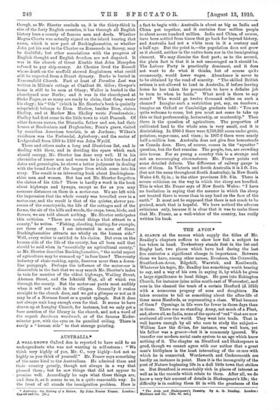AUSTRALIA.*
A WELL-KNOWN Oxford don is reported to have said to an undergraduate who was not wanting in self-esteem : "We think very highly of you, Mr. C., very highly—but not so highly as you think of yourself." Mr. Fraser says something of the same kind to the Australians. He admired them and their country greatly, though not always in a way that pleased them ; but he saw things that did not appear to promise well. Accordingly he says what these things are, and does it, as it seems to us, in a quite reasonable way.- In the front of all stands the immigration problem. Here is • Australia: tho Making of a Nation. By John Foster Fraser. London: casmat and Co. Os.) a fact to begin with : Australia is about as big as India and China put together, and it contains four million people to about seven hundred million. India and China, of course, have been settled from times that go back far beyond history, and Australia had not a white man in it a century and a half ago. But the point is,—the population does not grow as it should, neither in the native-born nor in the immigrating element. We may dismiss the first part ; as to the second, the plain fact is that it is not encouraged as it should be. The Labour Party is practically dominant, and it does not want to do what it thinks, but of course qu:ts erroneously, would lower wages. Abundance is never to to be obtained by the road of scarcity. "The skilled British artisan is not allowed to land in Australia, if before leaving home he has taken the precaution to have a definite job to turn to when he lands." What need is there to say more ? Who would go twelve thousand miles on such a chance ? Imagine such a restriction put, say, on teachers ; imagine an Oxford or Cambridge graduate told : "You are quite welcome to come, but you must not come to take up this or that professorship, lectureship, or mastership." Then there is the question of agriculture. The proportion of cultivated land to the whole area is very small, and it is diminishing. In 1900-1 there were 8,750,303 acres under grain, potatoes, sugar-cane, and vines ; in 1907-8 there were nearly half-a-million less. Australia does not give free homesteads as Canada does. Here, of course, comes in the "squatter" question, but the fact remains. The people, too, are crowding into towns. For so young a country this is a strange and not an encouraging circumstance. Mr. Fraser points out some detailed defects. The difference of railway gauge is one of them. In Victoria and South Australia it is 5 ft. 3 in. (but not the same throughout South Australia); in New South Wales 4 ft. 81 in. ; in the other provinces 3 ft. 6 in. There is severe criticism on the way in which the sheep are handled. This is what Mr. Fraser says of New South Wales : "I have no hesitation in saying that the manner in which the sheep are treated there is worse than in any land on the face of the earth." It must not be supposed that there is not much to be praised, much that is hopeful. We have noticed the adverse criticisms only, because it is clear that it was to make these that Mr. Fraser, as a well-wisher of the country, has really written his book.






































 Previous page
Previous page